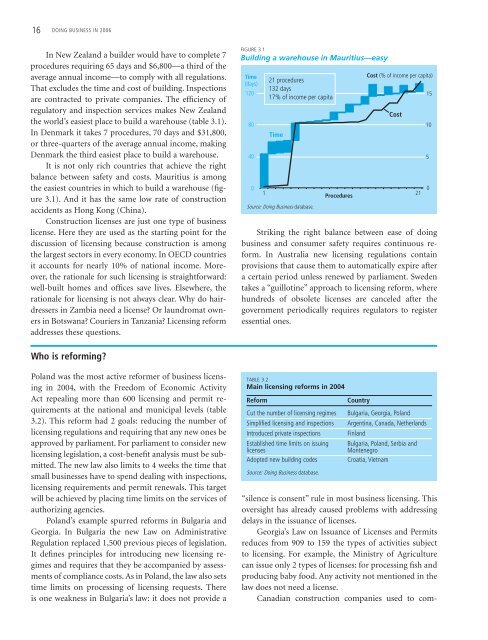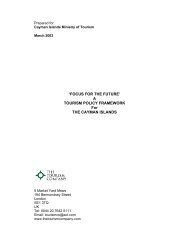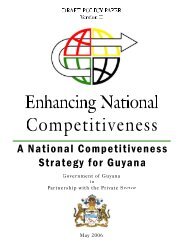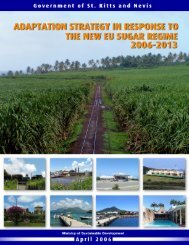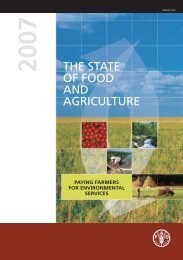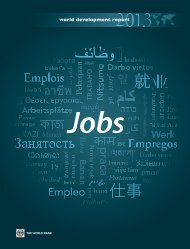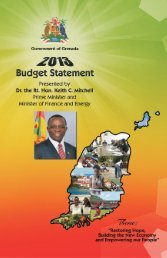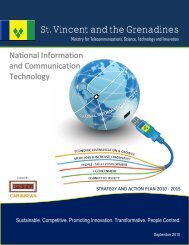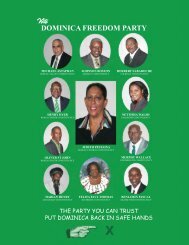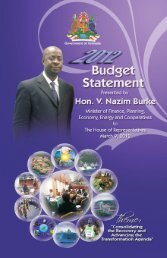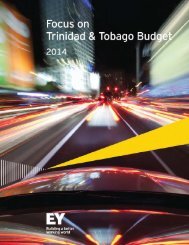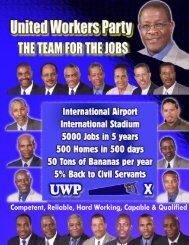Creating
Doing Business in 2006 -- Creating Jobs - Caribbean Elections
Doing Business in 2006 -- Creating Jobs - Caribbean Elections
Create successful ePaper yourself
Turn your PDF publications into a flip-book with our unique Google optimized e-Paper software.
16 DOING BUSINESS IN 2006<br />
In New Zealand a builder would have to complete 7<br />
procedures requiring 65 days and $6,800—a third of the<br />
average annual income—to comply with all regulations.<br />
That excludes the time and cost of building. Inspections<br />
are contracted to private companies. The efficiency of<br />
regulatory and inspection services makes New Zealand<br />
the world’s easiest place to build a warehouse (table 3.1).<br />
In Denmark it takes 7 procedures, 70 days and $31,800,<br />
or three-quarters of the average annual income, making<br />
Denmark the third easiest place to build a warehouse.<br />
It is not only rich countries that achieve the right<br />
balance between safety and costs. Mauritius is among<br />
the easiest countries in which to build a warehouse (figure<br />
3.1). And it has the same low rate of construction<br />
accidents as Hong Kong (China).<br />
Construction licenses are just one type of business<br />
license. Here they are used as the starting point for the<br />
discussion of licensing because construction is among<br />
the largest sectors in every economy. In OECD countries<br />
it accounts for nearly 10% of national income. Moreover,<br />
the rationale for such licensing is straightforward:<br />
well-built homes and offices save lives. Elsewhere, the<br />
rationale for licensing is not always clear. Why do hairdressers<br />
in Zambia need a license? Or laundromat owners<br />
in Botswana? Couriers in Tanzania? Licensing reform<br />
addresses these questions.<br />
<br />
<br />
<br />
<br />
<br />
<br />
<br />
<br />
<br />
<br />
<br />
<br />
<br />
<br />
<br />
<br />
<br />
Striking the right balance between ease of doing<br />
business and consumer safety requires continuous reform.<br />
In Australia new licensing regulations contain<br />
provisions that cause them to automatically expire after<br />
a certain period unless renewed by parliament. Sweden<br />
takes a “guillotine” approach to licensing reform, where<br />
hundreds of obsolete licenses are canceled after the<br />
government periodically requires regulators to register<br />
essential ones.<br />
<br />
<br />
<br />
<br />
<br />
Who is reforming?<br />
Poland was the most active reformer of business licensing<br />
in 2004, with the Freedom of Economic Activity<br />
Act repealing more than 600 licensing and permit requirements<br />
at the national and municipal levels (table<br />
3.2). This reform had 2 goals: reducing the number of<br />
licensing regulations and requiring that any new ones be<br />
approved by parliament. For parliament to consider new<br />
licensing legislation, a cost-benefit analysis must be submitted.<br />
The new law also limits to 4 weeks the time that<br />
small businesses have to spend dealing with inspections,<br />
licensing requirements and permit renewals. This target<br />
will be achieved by placing time limits on the services of<br />
authorizing agencies.<br />
Poland’s example spurred reforms in Bulgaria and<br />
Georgia. In Bulgaria the new Law on Administrative<br />
Regulation replaced 1,500 previous pieces of legislation.<br />
It defines principles for introducing new licensing regimes<br />
and requires that they be accompanied by assessments<br />
of compliance costs. As in Poland, the law also sets<br />
time limits on processing of licensing requests. There<br />
is one weakness in Bulgaria’s law: it does not provide a<br />
TABLE 3.2<br />
Main licensing reforms in 2004<br />
Reform<br />
Cut the number of licensing regimes<br />
Simplifi ed licensing and inspections<br />
Introduced private inspections<br />
Established time limits on issuing<br />
licenses<br />
Adopted new building codes<br />
Source: Doing Business database.<br />
Country<br />
Bulgaria, Georgia, Poland<br />
Argentina, Canada, Netherlands<br />
Finland<br />
Bulgaria, Poland, Serbia and<br />
Montenegro<br />
Croatia, Vietnam<br />
“silence is consent” rule in most business licensing. This<br />
oversight has already caused problems with addressing<br />
delays in the issuance of licenses.<br />
Georgia’s Law on Issuance of Licenses and Permits<br />
reduces from 909 to 159 the types of activities subject<br />
to licensing. For example, the Ministry of Agriculture<br />
can issue only 2 types of licenses: for processing fish and<br />
producing baby food. Any activity not mentioned in the<br />
law does not need a license.<br />
Canadian construction companies used to com-


